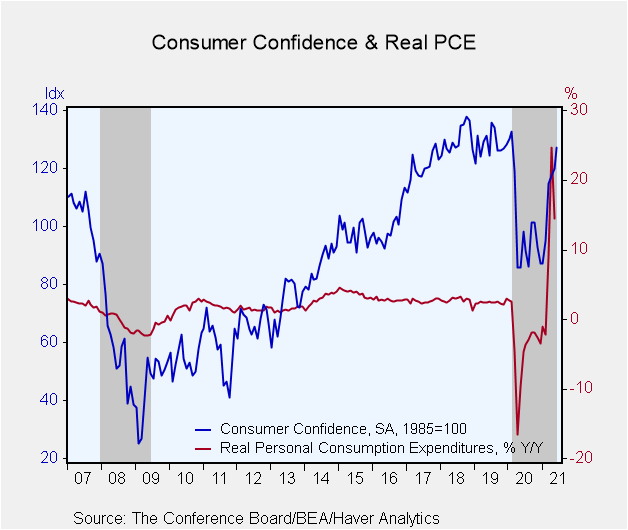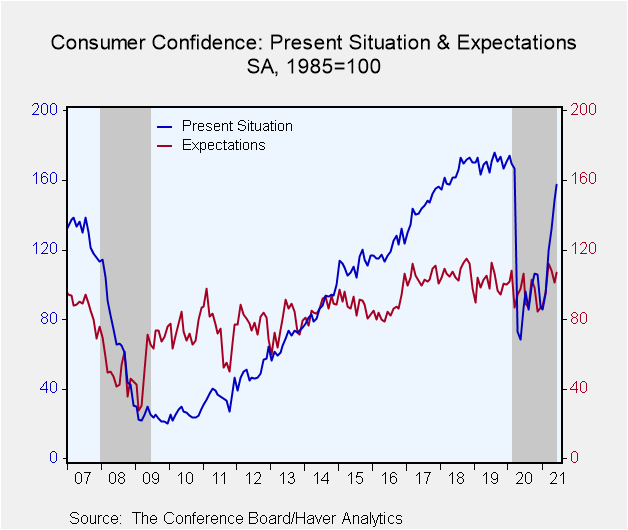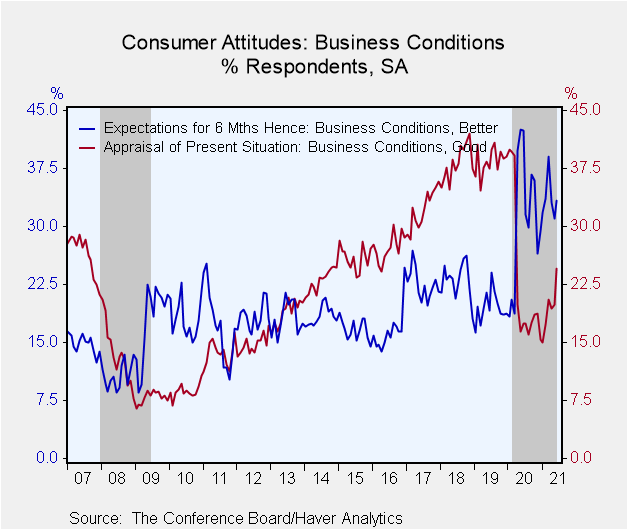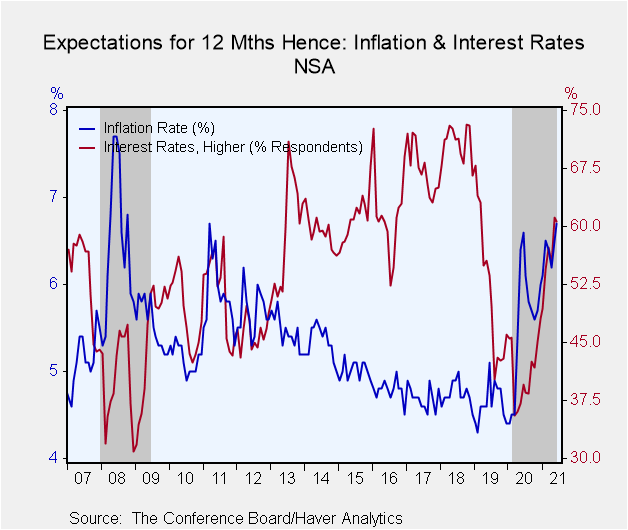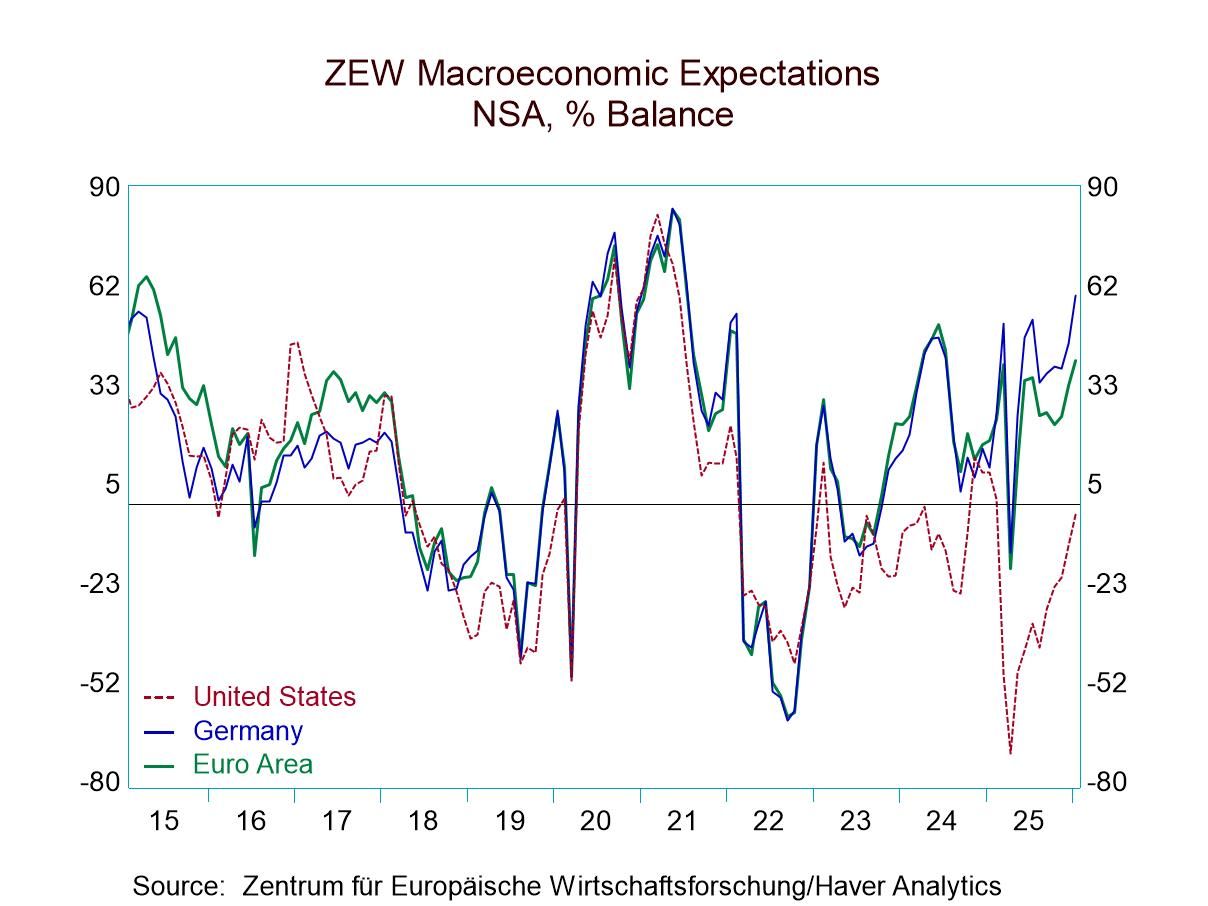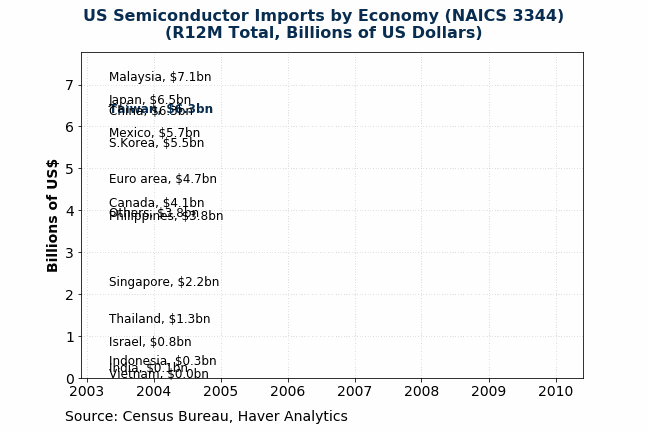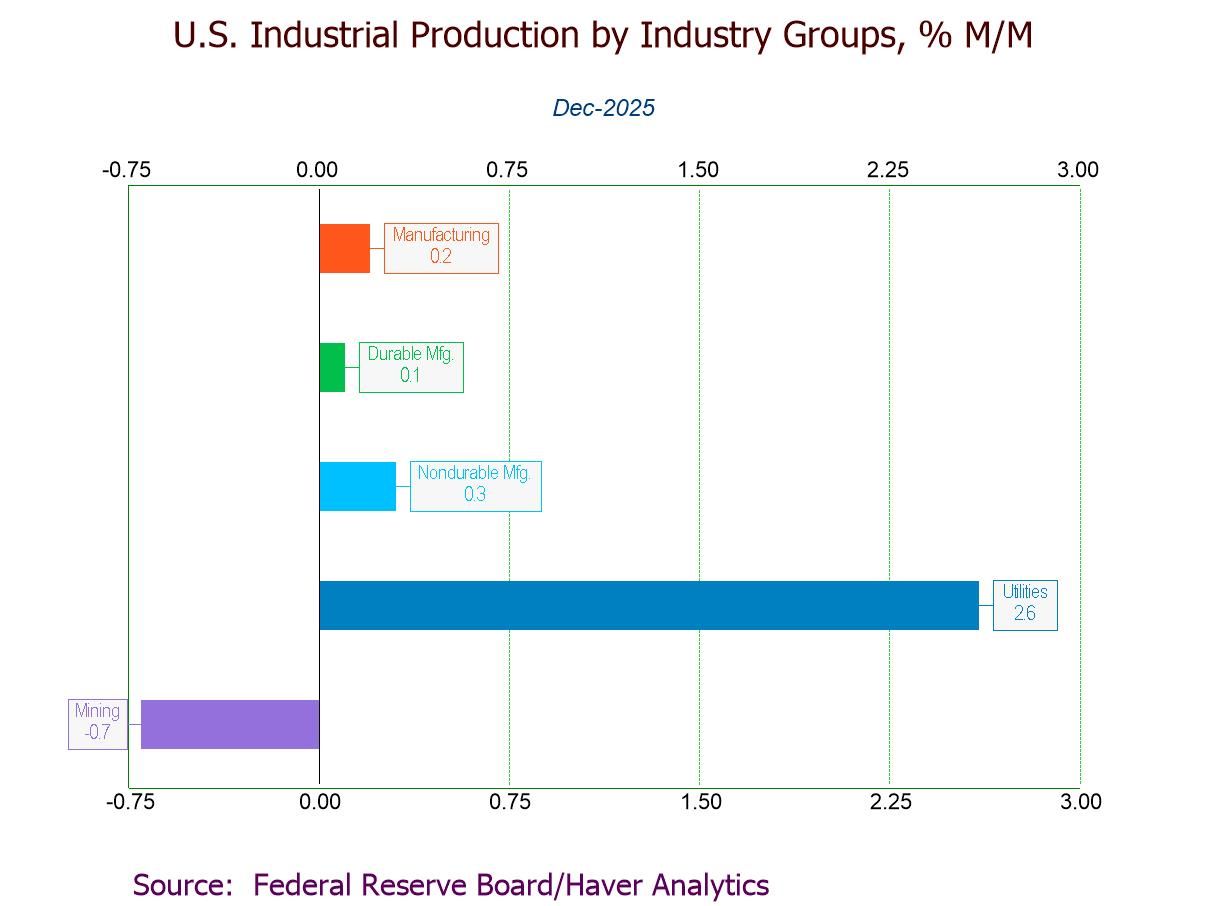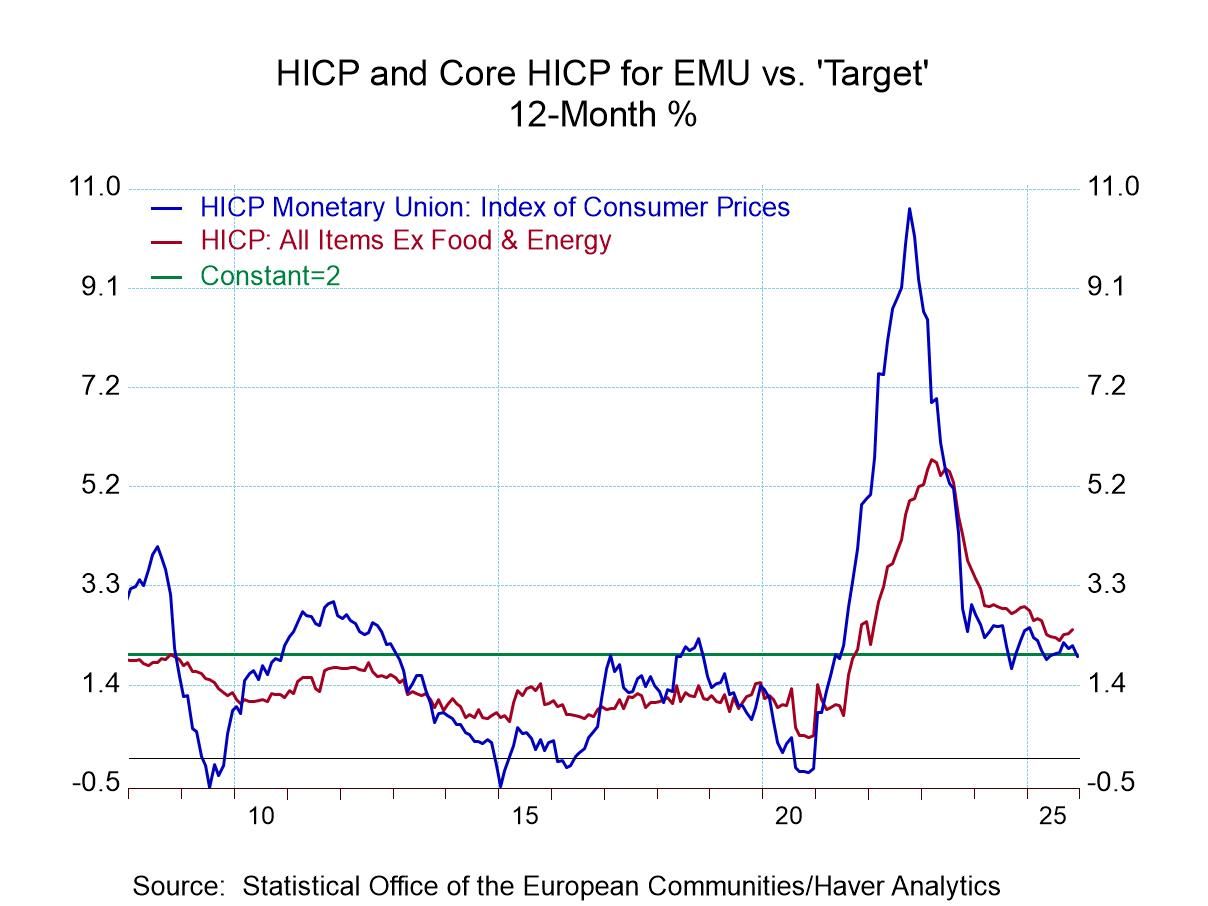 Global| Jun 29 2021
Global| Jun 29 2021U.S. Consumer Confidence Is Unexpectedly Strong in June
by:Tom Moeller
|in:Economy in Brief
Summary
• Confidence reaches thirteen-month high. • Improvement is logged in current conditions and expectations. • Job market indexes continue to strengthen. The Conference Board Consumer Confidence Index jumped 6.1% this month to 127.3 [...]
• Confidence reaches thirteen-month high.
• Improvement is logged in current conditions and expectations.
• Job market indexes continue to strengthen.
The Conference Board Consumer Confidence Index jumped 6.1% this month to 127.3 (29.5% y/y) from 120.0 in May, revised from 117.2. A June reading of 119.0 was expected in the Action Economics Forecast Survey. The confidence index was vastly improved versus the April 2020 low of 85.7.
The Present Situation index improved 6.1% (81.9% y/y) to 157.7 in June, the highest level in twelve months. The Consumer Expectations reading rose 6.0% (0.8% y/y) to 107.0 and reversed most of its May decline.
The jobs gap, representing the difference between respondents indicating that jobs are plentiful and those saying jobs are hard to get, strengthened to a near-record 43.5% from 36.9% in May. This series has had a 76% correlation with the unemployment rate over the last ten years. The rise this month in the labor market differential occurred as the jobs plentiful measure surged, also to a near-record high. Continuing to fall was the jobs hard-to-get index to a near-record low.
Business conditions were perceived as good by a greatly increased 24.5% of respondents in June. Expectations that business conditions would improve in six months rose moderately to 33.3%. More jobs were expected in six months by a greatly lessened 25.7% of respondents, down from 38.4% twelve months ago. The percentage expecting income to increase rose to 18.6%, the most since March of last year.
The expected inflation rate in twelve months surged to 6.7% this month. That was the highest level since March 2011 and increased from 4.4% early last year. The share of respondents planning to buy a new home edged up to 0.6% but remained down from 2.0% twelve months earlier. Those planning to buy a major appliance recovered moderately to 48.1% but remained below this past February's high of 52.9%.
Confidence of individuals under 35 years as well as those 55 and over surged to roughly one-year highs in June. Confidence amongst those between 35 and 54 rose modestly m/m, but also stood at a roughly one-year high.
The Consumer Confidence data are available in Haver's CBDB database. The total indexes, which are indexed to 1985=100, appear in USECON, and market expectations are in AS1REPNA.
| Conference Board (SA, 1985=100) | Jun | May | Apr | Jun '20 | 2020 | 2019 | 2018 |
|---|---|---|---|---|---|---|---|
| Consumer Confidence Index | 127.3 | 120.0 | 117.5 | 98.3 | 101.0 | 128.3 | 130.1 |
| Present Situation | 157.7 | 148.7 | 131.9 | 86.7 | 109.8 | 169.8 | 164.8 |
| Expectations | 107.0 | 100.9 | 107.9 | 106.1 | 95.2 | 100.6 | 107.0 |
| Jobs Gap (%) | 43.5 | 36.9 | 21.6 | -2.8 | 6.8 | 33.2 | 27.6 |
| Jobs Plentiful (%) | 54.4 | 48.5 | 36.3 | 20.5 | 27.8 | 45.8 | 42.0 |
| Jobs Hard to Get (%) | 10.9 | 11.6 | 14.7 | 23.3 | 21.0 | 12.6 | 14.4 |
Tom Moeller
AuthorMore in Author Profile »Prior to joining Haver Analytics in 2000, Mr. Moeller worked as the Economist at Chancellor Capital Management from 1985 to 1999. There, he developed comprehensive economic forecasts and interpreted economic data for equity and fixed income portfolio managers. Also at Chancellor, Mr. Moeller worked as an equity analyst and was responsible for researching and rating companies in the economically sensitive automobile and housing industries for investment in Chancellor’s equity portfolio. Prior to joining Chancellor, Mr. Moeller was an Economist at Citibank from 1979 to 1984. He also analyzed pricing behavior in the metals industry for the Council on Wage and Price Stability in Washington, D.C. In 1999, Mr. Moeller received the award for most accurate forecast from the Forecasters' Club of New York. From 1990 to 1992 he was President of the New York Association for Business Economists. Mr. Moeller earned an M.B.A. in Finance from Fordham University, where he graduated in 1987. He holds a Bachelor of Arts in Economics from George Washington University.


